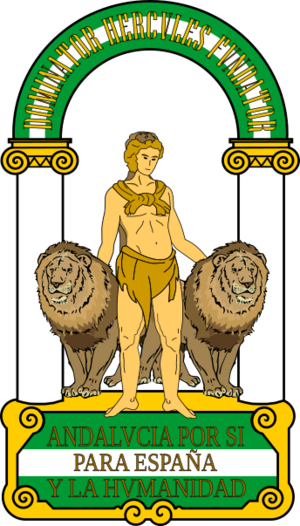Statute of Autonomy of Andalusia facts for kids
The Statute of Autonomy of Andalusia is a very important law for Andalusia, a region in Spain. Think of it as Andalusia's own rulebook. This law is below Spain's main law, the 1978 Constitution of Spain, but above any other laws made by the Andalusian Autonomous Government.
During Spain's move to democracy, Andalusia chose a special "fast way" to get its own self-government. This was allowed because the Spanish Civil War had stopped Andalusia from getting its own rules earlier. So, on February 28, 1980, Andalusia became an autonomous community. This date is now celebrated as Andalusia Day. The Spanish government approved this special law the next year.
Contents
The First Statute: 1981
The first Statute of Autonomy for Andalusia is also known as the Statute of Carmona. It said that Andalusia's self-government was fair because of its "historical identity." This means Andalusia has a unique history and culture. The law also stated that Andalusia was fully equal to all other regions in Spain.
This Statute also officially named Blas Infante as the "Father of the Andalusian Nation." He was a very important person for Andalusian identity. The law also created special government groups for Andalusia. The main one is the Andalusian Autonomous Government, also called the Junta de Andalucía. Other important groups include:
- The Defensor del Pueblo Andaluz: This is like a public helper or an ombudsperson who looks out for people's rights.
- The Consultative Council.
- The Chamber of Accounts.
- The Audiovisual Council of Andalusia.
- The Economic and Social Council.
The New Statute: 2007
In 2006, a new version of the Statute of Autonomy was created. Important political parties in Spain, like the Spanish Socialist Workers' Party (PSOE), the United Left (IU), and the People's Party (PP), all agreed on it.
On November 2, 2006, the Spanish Parliament approved the new law. It was a big moment because no one voted against it! This was the first time a major law for a region's self-government was approved with no opposing votes. The Senate then approved it for a public vote.
What the 2007 Statute Says
The new Statute describes Andalusia as a "historic nationality." This means it has a long and distinct history as a region. It also mentions an old idea from 1919 that called Andalusia a "national reality."
The new law kept the same important government groups for Andalusia. The main one is still the Andalusian Autonomous Government (Junta de Andalucía). It also officially recognized Seville as the capital city of Andalusia.
How Andalusians Voted
On February 18, 2007, the people of Andalusia voted on the new Statute in a special election called a referendum. Most people who voted said "yes" to the new law.
|
Valid votes:
|
The new Statute of Autonomy officially started on March 19, 2007.
The Andalusianist Manifesto of Córdoba described Andalusia as a national reality in 1919, whose spirit the Andalusians took up outright through the process of self-government recognized in our Magna Carta. In 1978 the Andalusians broadly backed the constitutional consensus. Today, the Constitution, in its Article 2, recognizes Andalusia as a nationality as part of the indissoluble unity of the Spanish nation.
See also
 In Spanish: Estatuto de Autonomía de Andalucía para niños
In Spanish: Estatuto de Autonomía de Andalucía para niños


